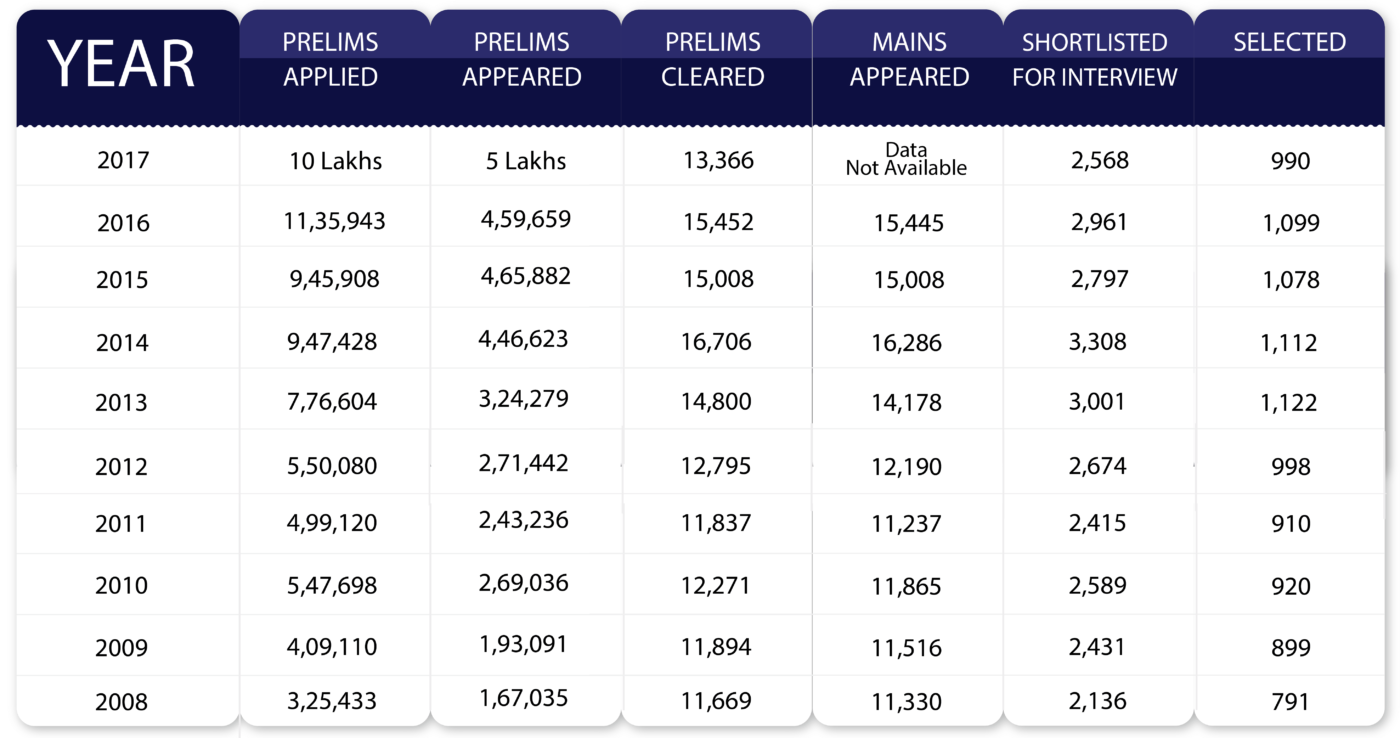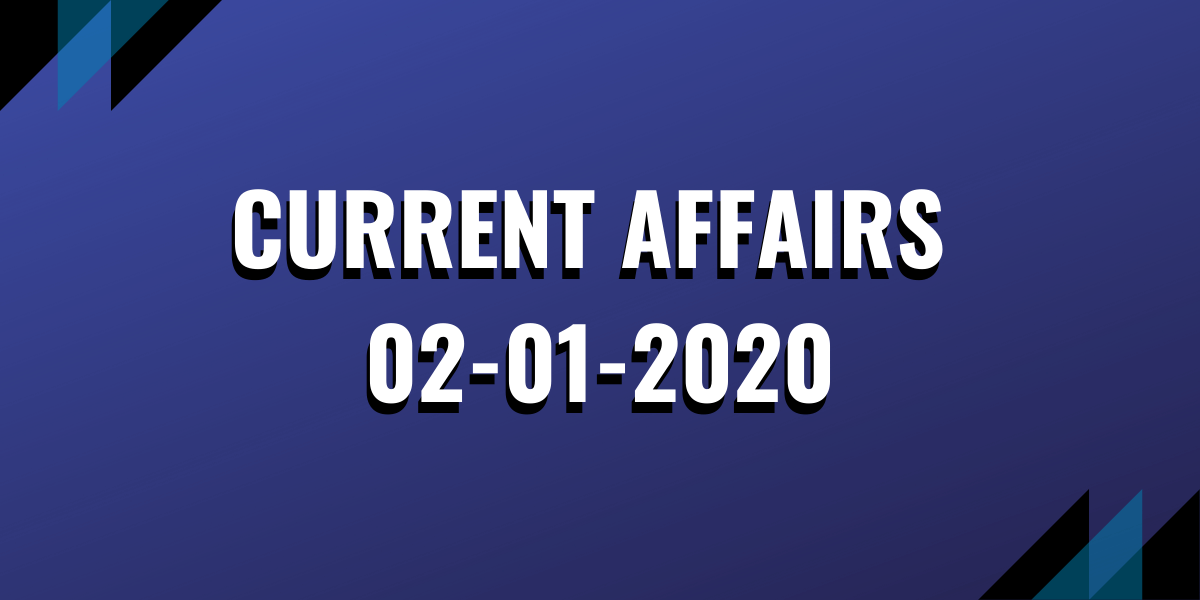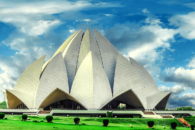Highlights |UPSC Exam Current Affairs 02-01-2020
UPSC exam current affairs 02-01-2020 The following article contains all the updated events and news for IAS Preparation. Our daily IAS Current Affairs and News cover the most important topics to give precise information to the reader and IAS Aspirants.
- Swachh Satcom technology: Rajasthan to utilize it in a big way League 2020: National Cleanliness Rankings Part of
- Pharma City in Telangana
- Invasive alien plants in Nilgiri Biosphere Region
- GOVERNANCE
- SPACE
Importance of Current Affairs in IAS Coaching
Watch Video – UPSC Exam Current Affairs 02-01-2020
Video Source – Shankar IAS Academy
find top institutes for IAS coaching
UPSC Exam Current Affairs 02-01-2020 are followed in the part below:
UPSC Exam Current Affairs and News Analysis (02-01-2020
Satcom technology: Rajasthan to utilize it in a big way
Part of: GS Prelims and GS Mains II- Governance
In News
- Rajasthan Government has begun utilizing satellite correspondence innovation to improve the learning result in instructive establishments – for getting the administrations of subject specialists in the administration schools and universities
- The organizations with the deficiency of educators will particularly profit by the geostationary satellite uplinking offices.
- Government is additionally utilizing the innovation to create mindfulness about social welfare plans while offering need to the five optimistic regions chose by NITI Aayog in the State.
About Aspirational Districts.
- The Aspirational District Program was propelled by the Prime Minister on January 5, 2018. It means to rapidly and viably change a portion of India’s most immature regions.
- It will recognize regions of quick improvement, measure progress, and rank locale (done by NITI Aayog)
- The broad ideas of the programme include –
- the convergence of central and state schemes
- collaboration of central, state-level ‘Prabhari’ (in-charge) officers and district collectors
- competition among districts
Pharma City in Telangana
Part of: GS Prelims and GS Mains II- Competitive Federalism; GS-III- Economy
In News
- Pharma City venture arranged by Telangana Government as the world’s greatest pharma bunch close to Hyderabad has gotten the National Investment and Manufacturing Zone (NIMZ) endorsement and the natural leeway for it from the Center.
- The fundamental framework at the Pharma City like setting up sub-stations and laying streets has just initiated. The legislature would need to chip away at building up a gushing treatment plant to make it a contamination-free undertaking.
About NIMZ
- NIMZs are one of the significant instruments of National Manufacturing Policy, 2011.
- Objective: To build the portion of assembling to 25 percent of the nation’s GDP while likewise making 100 million occupations throughout the following decade
- NIMZs have been considered as enormous coordinated mechanical townships with best in the class framework; land use based on zoning; clean and vitality proficient innovation; important social foundation; aptitude improvement offices, and so on.
- To empower the NIMZ to work as self-government and self-sufficient body, it will be proclaimed by the State Government as an Industrial Township under Article 243 Q (I) (c) of the Constitution.
- These NIMZs would be overseen by a Special Purpose Vehicle (SPV) which would guarantee ace arranging of the zone; pre-freedom for setting up the modern units to be situated inside the zone and embrace such different capacities
Invasive alien plants in Nilgiri Biosphere Region
Part of: GS Prelims and GS III- Environment
In News
- Obtrusive outsider species are plants, creatures, pathogens and different life forms that are non-local to a biological system, and which may cause financial or natural mischief or antagonistically influence human wellbeing.
- The spread of intrusive plants, particularly Senna Spectabilis, is representing a significant risk to the Nilgiri woodland area, inferable from its speedy development and coppicing character
- The thick foliage arrests the growth of other indigenous species of trees and grass and causes food shortage for the wildlife population, especially herbivores, during summer.
- Moreover, wildlife would not feed on the leaves of the tree as it was not palatable for them
- The plant began to attack in neighbouring tiger holds, incorporating Bandipur and Nagarhole in Karnataka and the Mudumalai tiger save in Tamil Nadu
Import duty on crude, refined palm oils Cut
Part of: GS Prelims and GS II- International Affairs
In News
- Following up on the ASEAN and the India-Malaysia Comprehensive Economic Cooperation Agreements, the Center sliced import obligation on refined palmolein from half to 45%, while that on unrefined palm oil (CPO) from 40% to 37.5%
- The activity is said to seriously affect the residential palm oil refining industry and oilseeds ranchers.
Value Addition for Prelims
- ASEAN represents the Association of Southeast Asian Nations. It was framed in 1967, by Thailand, Singapore, Philippines, Malaysia, and Indonesia.
- Participation has been stretched out to incorporate Vietnam, Burma, Laos, Cambodia, and Brunei.
- Aside from monetary and political development it additionally centres around social advancement, social-social advancement among part nations, and arrangement of instruments and methodologies to determine contrasts calmly.
(MAINS FOCUS)
GOVERNANCE
TOPIC: General Studies 2:
- Significant parts of administration, straightforwardness and responsibility, e-administration applications, models, victories, impediments, and potential; residents sanctions, straightforwardness and responsibility and institutional and different measures.
Sustainable Development Goals (SDG) India: NITI Aayog recently released the Baseline Report of the Sustainable Development Goals (SDG) India Index
Context:
- The NITI Aayog as of late discharged the Baseline Report of the Sustainable Development Goals (SDG) India Index, which thoroughly records the advancement made by India’s States and Union Territories towards actualizing the 2030 SDG targets.
- The SDG India Index was created in a joint effort with the Ministry of Statistics and Program Implementation (MoSPI), Global Green Growth Institute and United Nations in India.
Background:
- The Sustainable Development Goals (SDGs) were received in September 2015 as a piece of the goals, ‘Changing our reality: the 2030 Agenda for Sustainable Development’. India is focused on accomplishing the 17 SDGs and the 169 related targets, which thoroughly spread social, financial and ecological elements of advancement and spotlight on consummation neediness in the entirety of its structures and measurements.
- At the Central Government level, NITI Aayog has been allocated the job of regulating the execution of SDGs in the nation.
Sabka Saath, Sabka Vikas
- NITI Aayog has the twin command to regulate the execution of SDGs in the nation, and furthermore advance Competitively and Cooperative Federalism among States and UTs.
- The SDG India Index goes about as a scaffold between these orders, adjusting the SDGs to the Prime Minister’s clarion call of Sabka Saath, Sabka Vikas, which typifies the five Ps of the worldwide SDG development – individuals, planet, success, organization and harmony.
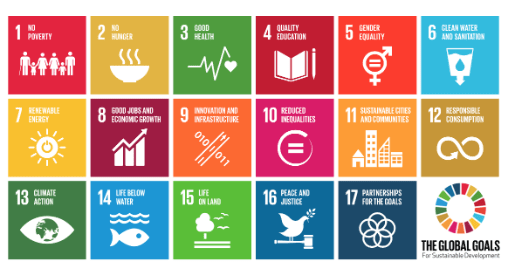
SDG:
- The SDGs are yearning worldwide advancement objectives that address key parts of general prosperity crosswise over various financial, social, geological divisions and coordinate the monetary, social and ecological elements of improvement.
SDG & India:
- India’s National Development Agenda is reflected in the SDGs.
- India’s advancement in SDGs is pivotal for the world as the nation is home to about 17% of the total populace.
- The SDG India Index tracks the advancement everything being equal and UTs on 62 Priority Indicators chose by NITI Aayog, which thusly is guided by MoSPI’s National Indicator Framework containing 306 pointers and dependent on various round interviews with Union Ministries/Departments and States/UTs.
Working:
- A composite score was processed between the scope of 0-100 for each State and UT dependent on their total execution crosswise over 13 SDGs, which shows the normal execution of State/UT towards accomplishing 13 SDGs and their particular targets.
- On the off chance that a State/UT accomplishes a score of 100, it connotes that it has accomplished the 2030 national targets. The higher the score of a State/UT, the more noteworthy the separation to the objective accomplished.
Classification Criteria based on SDG India Index Score is as follows:
- Aspirant: 0-49
- Performer: 50-64
- Front Runner: 65-99
- Achiever: 100
| OVERALL | Aspirant | Assam, Bihar and Uttar Pradesh |
| Performer | Andhra Pradesh, Arunachal Pradesh, Chhattisgarh, Goa, Gujarat, Haryana, Jammu & Kashmir, Jharkhand, Karnataka, Madhya Pradesh, Maharashtra, Manipur, Meghalaya, Mizoram, Nagaland, Odisha, Punjab, Rajasthan, Sikkim, Telangana, Tripura, Uttarakhand, West Bengal, Andaman & Nicobar Islands, Dadra & Nagar Haveli, Daman & Diu, Delhi and Lakshadweep | |
| Front Runner | Himachal Pradesh, Kerala, Tamil Nadu, Chandigarh and Puducherry | |
| Achiever | NA |
Significance:
- The SDG India Index will likewise help feature significant holes identified with following SDGs and the requirement for India to build up its factual frameworks at National and State/UT levels. This will prompt the record developing and getting increasingly extensive over the coming years.
- The markers will be additionally refined and extra pointers will be included with progress in information assortment, detailing forms and approach.
- NITI Aayog is additionally investigating the potential for disaggregating information and creating limit with respect to ongoing observing and estimating steady advancement.
Overall Findings:
| Particular | State | UT |
| SDG India Index Score Range | 42-69 | 57-68 |
| Top Performer/s | Himachal Pradesh & Kerala | Chandigarh |
| Aspirant | Uttar Pradesh | Dadra & Nagar Haveli |
- Himachal Pradesh positions high on giving clean water and sanitation, in decreasing imbalances and safeguarding mountain biological system
- Kerala’s top position is credited to its unrivalled presentation in giving great wellbeing, lessening hunger, accomplishing sexual orientation fairness and giving quality instruction
- Chandigarh drives due to its excellent presentation in giving clean water and sanitation, reasonable and clean vitality, producing average work and financial development, and giving quality training
Connecting the dots:
- Do you think SDG brings governance change in India?
- How do you think it Impacts the Indian Economy?
SPACE
TOPIC: General Studies 3:
- Awareness in the fields of IT, Space, Computers, robotics, nano-technology, bio-technology and issues relating to intellectual property rights.
Gaganyaan: In mission mode, says ISRO
In news:
- Four pilots from the Indian Air Force (IAF) will leave for Russia this month to get preparing as space explorers of Gaganyaan, the main Indian manned trip to space.
- It is a ₹10,000-crore Indian human space flight planned for 2022.
- The picked space travellers will be sent to space on-board Gaganyaan, a team container, to be propelled with the assistance of Geo-Synchronous Launch Vehicle (GSLV)
- In the event that Gaganyaan is effective, India would turn into the fourth country to accomplish the accomplishment
- India has consented to arrangements with Russia and France for collaboration on the Gaganyaan crucial.
- DRDO marked MoUs with ISRO to offer advancements for the crucial, space nourishment, endurance packs for the group, radiation assurance gear and parachutes.
- India’s first man in space Rakesh Sharma, who flew onboard the Soyuz T-11, propelled on 2 April 1984, was an Indian Air Force pilot.
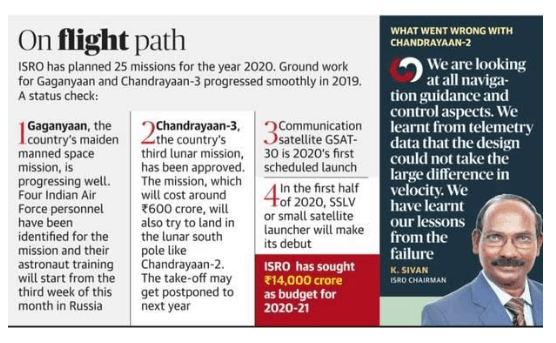
Background and Timeline: From an idea to a plan
- Arrangements have been going on since 2004 when the kept an eye on space crucial originally supported by the ISRO Policy Planning Committee; there was the absence of lucidity on when precisely the mission would be propelled, the objective at first it was 2015.
- 2004: ISRO Policy Planning Committee prescribes a kept an eye on space crucial.
- 2006: National advisory group involving 80 researchers and technocrats underwrites the proposition.
- 2007: First open declaration of the human space program
- 2009: Another specialists’ board of trustees, talks about the attractive quality and practicality of the program and communicates support
- 2010: Failure of GSLV-D3 and Failure of GSLV-F06
- 2014: Successful testing of a trial trip of GSLV Mk-III; this additionally effectively tests a trial group module, showing reemergence capacity
- June 2017: First ‘formative’ trip of GSLV Mk-III
- July 2018: First effective trip of the team escape framework or “cushion prematurely end” test.
- August 15, 2018: Prime Minister declares kept an eye on crucial happen before 2022
Challenges:
- A watched out for space vital out and out unique in relation to each other critical ISRO has so far wrapped up.
- To the extent multifaceted nature and want, even the missions to the Moon (Chandrayaan) and Mars (Mangalyaan) are no spot in the assessment.
- For a watched out for vital, key unmistakable limits that ISRO has expected to develop the ability to return the rocket to Earth after the flight, and to amass a van where space voyagers can live in Earth-like conditions in space.
- Consistently, ISRO has successfully attempted an impressive part of the developments that are required, yet various others are still to be made and attempted.
The rocket: GSLV Mk-III
- The shuttle conveying people, called group module, is probably going to say something abundance of 5 to 6 tons.
- ISRO’s primary dispatch vehicle, the PSLV (Polar Satellite Launch Vehicle), which conveyed the Chandrayaan and Mangalyaan missions as well, can convey payloads that are scarcely as much as 2 tons, and that excessively just to circles at around 600 km height from the Earth’s surface.
- That is the reason the improvement of GSLV Mk-III, a dispatch vehicle with capacities to convey a lot heavier payloads a lot further into space, was vital.
- Following three many years of endeavours, for the most part, amassed at building up an indigenous cryogenic motor to control the rocket, ISRO effectively tried GSLV Mk-III, presently called LVM-3 (Launch Vehicle Mark-3), in a trial trip in December 2014.
- June 2017, ISRO effectively propelled the main “formative” trip of LVM-3, which conveyed the GSAT-19 satellite into space.
- The LVM-3 is the proclaimed dispatch vehicle for taking the kept an eye on the group module into space. Throughout the following barely any years, a lot more flights of GSLV are booked.
Re-entry & recovery tech
- The satellites propelled by ISRO including Chandrayaan and Mangalyaan, typically intended to stay in space, in any event, when their life is finished.
- Any kept an eye on the shuttle, be that as it may, necessities to return. This includes acing of the exceptionally confused and hazardous reemergence and recuperation capacity.
- While returning Earth’s air, the shuttle needs to withstand high temperatures, which is made because of erosion.
- Additionally, the rocket needs to tenant the environment at an extremely exact speed and point, and even the smallest deviation could end in misfortune.
- The main fruitful trial trip of GSLV Mk-III on December 18, 2014, likewise included the effective testing of an exploratory group module that returned to Earth in the wake of being taken to an elevation of 126 km into space.
- The Crew module Atmospheric Re-section Experiment (CARE) rocket reappeared the air at around 80 km height and arrived in the ocean close to the Andaman and Nicobar Islands.
Crew Escape System
- This is a crucial safety technology, involving an emergency escape mechanism for the astronauts in case of a faulty launch.
- The mechanism ensures the crew module gets an advance warning of anything going wrong with the rocket, and pulls it away to a safe distance, after which it can be landed either on sea or on land with the help of attached parachutes.
- Recently, ISRO completed the first successful flight of the crew escape system. A simulated crew module weighing about 3.5 tonnes was launched from Sriharikota.
Life support
- The Environmental Control and Life Support System (ECLSS) is intended to guarantee that conditions inside the team module are reasonable for people to live easily.
- Within the team, the module is a twin-walled fixed structure that will reproduce Earth-like conditions for the space explorers.
- The ECLSS keeps up relentless compartment pressurization and air structure evacuates carbon dioxide and other unsafe gases controls temperature and mugginess and oversees parameters like fire identification and concealment, nourishment and water the board, and crisis support.
- While the plan and design of the ECLSS and within the team module has been finished, different segments and frameworks are being tried.
- Ground testing should be trailed by tests in the space circle while reenacting zero gravity and profound vacuum
Astronaut training
- In the early piece of the arranging, a proposition for setting up a space explorer preparing focus in Bangalore was glided. At first, focused by 2012, it is yet to take off.
- While ISRO still intends to set up a perpetual office, the chose possibility for the primary kept an eye on crucial in all likelihood train at an outside office.
- Applicants should prepare for at any rate two years in living in zero gravity and managing an assortment of sudden encounters of living in space.
- Some preparation would likewise be bestowed at the Institute of Aerospace Medicine of the Indian Air Force at Bengaluru.
Budget
- During the early long stretches of arranging, the expense of India’s previously kept an eye on space strategic evaluated at Rs 12,400 crore. In any case, that was for a strategic be propelled in 2015.
- The crucial presently be finished for not as much as Rs 10,000 crore.
- As of late, the administration endorsed the financing for the following 10 flights of GSLV Mk-III at an expected expense of Rs 4,338.2 crore. This should deal with GSLV Mk-III missions till 2024.
Conclusion:
- On the off chance that India launches the Gaganyaan crucial, will be the fourth country to do as such after the United States, Russia and China.
- These improvements will help ISRO in culminating the cryogenic innovation for sending up heavier and heavier payloads and will diminish India’s reliance on different nations to dispatch heavier satellites.
Connecting the dots:
- What advantages would India’s proposed manned mission to space bring to society?
- Do you think this mission makes India the world leader in a space mission?
(TEST YOUR KNOWLEDGE)
Model questions: (You can now post your answers in the comment section)
Q.1) Consider the following statements about Gaganyaan Mission
- Astronauts will be sent to space on board Gaganyaan, a crew capsule, to be launched with the help of Polar Satellite Launch Vehicle (PSLV)
- India is cooperating with Russia and France for a successful Gaganyaan mission.
Which of the above statement(s) given above is/are correct?
- 1 only
- 2 only
- Both 1 and 2
- Neither 1 nor 2
Q.2) Consider the following statements about National Investment Manufacturing Zones
- The aim to increase the share of manufacturing to 25 percent of the country’s GDP while also creating 100 million jobs over the next decade
- It will be declared by the State Government as an Industrial Township under Article 243 Q (I) (c) of the Constitution
Which of the statement(s) given above is/are correct?
- 1 only
- 2 only
- Both 1 and 2
- Neither 1 nor 2
Q.3) Mudumalai tiger reserve is located in which the State of India?
- Karnataka
- Kerala
- Andhra Pradesh
- Tamil Nadu
Q.4) Consider the following statements about ASEAN
- The 10-member South East Asian grouping not only has an objective on improving economic cooperation and growth but on social progress, social-cultural evolution among member countries
- India has a Free Trade Agreement with ASEAN
Which of the statement(s) given above is/are correct?
- 1 only
- 2 only
- Both 1 and 2
- Neither 1 nor 2
Importance of Current Affairs in IAS Coaching
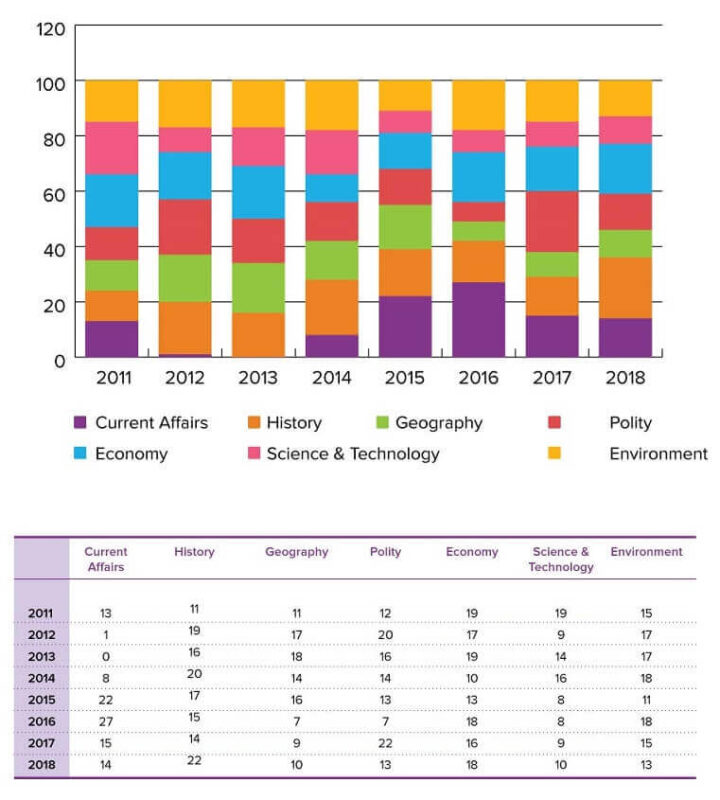
Check out more IAS Coaching Current Affairs
Also, Check Out the All the Details about the IAS Exam
